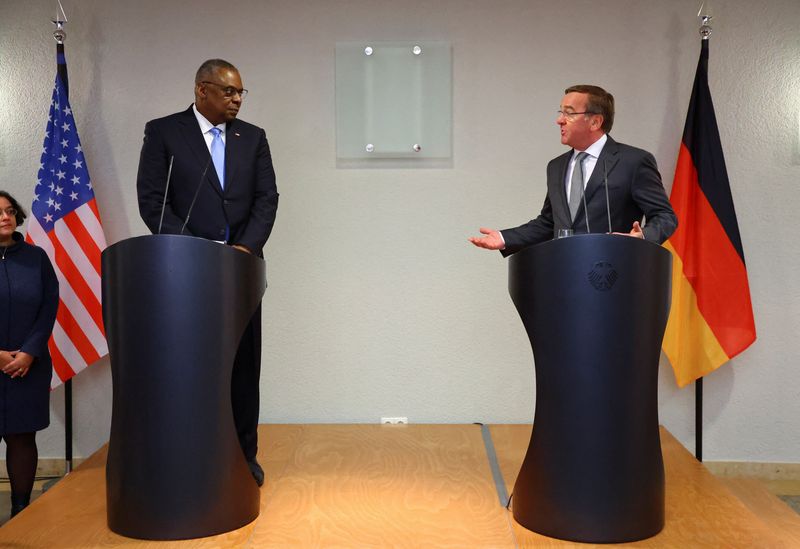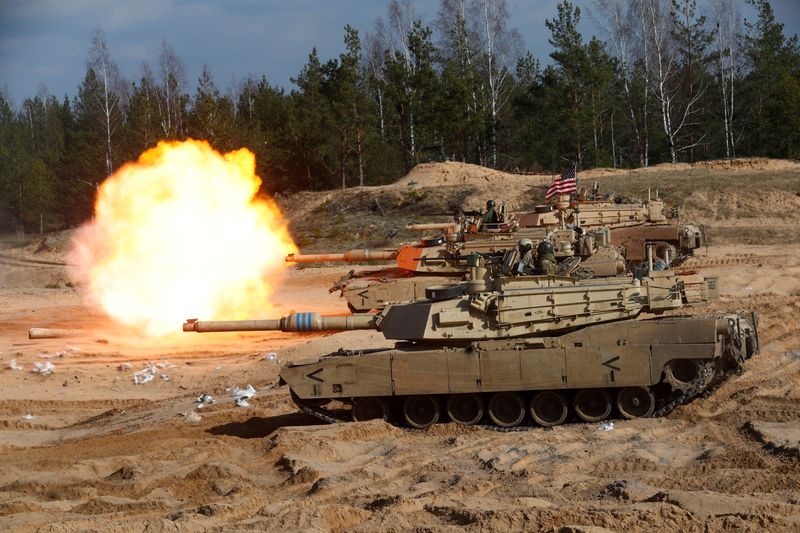By Max Hunder and Madeline Chambers
KYIV/BERLIN (Reuters) -Western allies pledged billions of dollars in weapons for Ukraine on Thursday and some promised to send the tanks Kyiv has requested if Berlin agrees, but Germany gave no sign of lifting a veto on deliveries it fears would provoke Moscow.
The issue looks set to dominate Friday talks in Germany between Western allies at Ramstein, Washington's main European air base.
Fearing winter will give Russian forces time to regroup and unleash a major attack, Ukraine is pushing for the German-made Leopard battle tanks, which are held by an array of NATO nations but whose transfer to Ukraine requires Germany's approval.
"Our people are dying every day," Ukrainian President Volodomyr Zelenskiy told German ARD television late on Thursday. "If you have Leopard tanks, give them to us." Ukraine needed them to defend itself, recapture occupied land, and did not plan to attack Russia, he added.
German Chancellor Olaf Scholz, a Social Democrat, has been reluctant to send weapons that could be seen as provoking Moscow. Many of Berlin's Western allies say that concern is misplaced, with Russia already fully committed to war, while Russia has repeatedly said Western weapons transfers would prolong the war and increase suffering in Ukraine.
A German government source previously said Berlin would lift its objections if Washington sends its own Abrams tanks.
"True leadership is about leading by example, not about looking up to others. There are no taboos," tweeted Zelenskiy's adviser Mykhailo Podolyak.
"From Washington to London, from Paris to Warsaw, you hear one thing: Ukraine needs tanks. Tanks are the key to ending the war properly."
Ahead of the Ramstein meeting, 11 NATO countries, including Britain and Poland, pledged a raft of new military aid at a military base in Estonia on Thursday.
"We commit to collectively pursuing delivery of an unprecedented set of donations including main battle tanks, heavy artillery, air defence, ammunition, and infantry fighting vehicles to Ukraine's defence," their joint statement said.
The Leopard 2 tanks - workhorse of militaries across Europe and which Germany made in the thousands during the Cold War - require Germany's approval before being transferred to other countries.
Meanwhile, U.S. Defense Secretary Lloyd Austin and the new German Defence Minister Boris Pistorius met in Berlin, but there was no update on the tank decision.
Poland's Prime Minister Mateusz Morawiecki said later on Thursday he was "moderately sceptical" of Germany approving the tanks for Ukraine because "the Germans are defending themselves against this like a devil protects himself against holy water."
Other European politicians expressed the contrary.
"Some of the countries will definitely send Leopard tanks to Ukraine, that is for sure", Lithuanian Defence Minister Arvydas Anusauskas told Reuters.
Dutch Defence Minister Kajsa Ollongren said she was confident a solution would be found, but that the Netherlands would need a green light from Berlin before deciding whether to contribute tanks.
Poland and Finland have already said they would send Leopards if Germany lifts its veto. In a sign of mounting frustration, Poland suggested it might do so even if Germany tries to block it.
Ukrainian officials pressed for an urgent decision. "We have no time, the world does not have this time," Andriy Yermak, head of the Ukrainian presidential administration, wrote on Telegram.
"We are paying for the slowness with the lives of our Ukrainian people. It shouldn't be like that."
NUCLEAR THREAT AND DIVIDED PUBLIC
Russia has responded to the prospect of more weapons for Kyiv with threats of escalation. Dmitry Medvedev, an ally of President Vladimir Putin who stood in as president from 2008-2012 when Putin took a hiatus to act as prime minister, made one of Moscow's clearest threats to use nuclear weapons if it loses in Ukraine.
"The defeat of a nuclear power in a conventional war may trigger a nuclear war," Medvedev said. "Nuclear powers have never lost major conflicts on which their fate depends."
By tying the Leopards to U.S. Abrams tanks Germany could shift the onus onto Washington. A poll by German ARD television showed how divisive the issue is in the country, with 46% in favour of allowing the tanks to be sent and 43% against.
Many Germans viewed the end of the Cold War as the end of major conflict for the West. That optimism, combined with a pacifism rooted in its guilt over its role in two World Wars, meant Germany retreated on defence, effectively outsourcing its security to its U.S. ally, analysts say.
Colin Kahl, the Pentagon's top policy adviser, said on Wednesday Abrams tanks were not likely to be included in Washington's next massive $2 billion military aid package. They are considered by many experts to be unsuitable for the conditions in Ukraine.
Ukraine and Russia have both relied primarily on Soviet-era T-72 tanks, which have been destroyed in their hundreds in 11 months of fighting.
After big Ukrainian gains in the second half of 2022, the frontlines have largely been frozen in place over the past two months, with neither side making big gains despite heavy casualties in intense trench warfare.

Yevgeny Prigozhin, leader of the private Russian mercenary force Wagner that has taken a leading role in fighting near the eastern city of Bakhmut, claimed on Thursday his forces had seized the village of Klishchiivka on Bakhmut's outskirts. Kyiv has previously denied that the settlement has fallen.
Reuters could not confirm the situation there.
